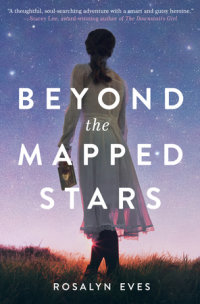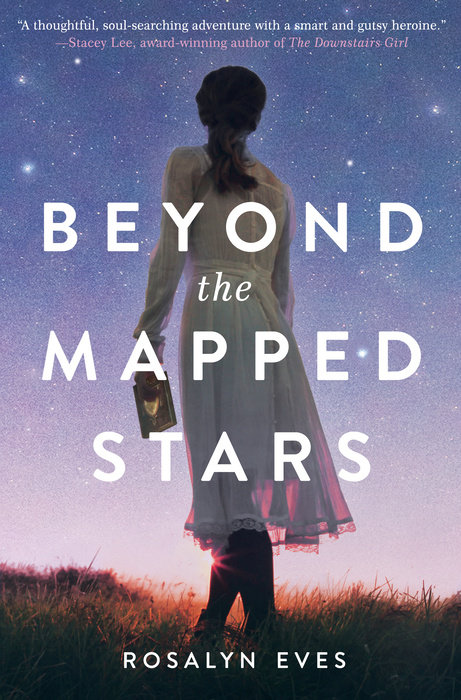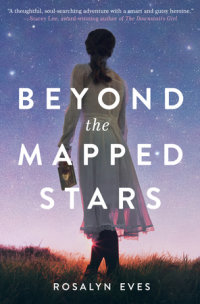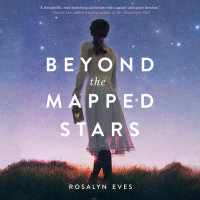Beyond the Mapped Stars
Author Rosalyn Eves
A sweeping adventure, set in the late 19th century, about science, love, and finding your place in the world, perfect for fans of Ruta Sepetys and Julie Berry.
Seventeen-year-old Elizabeth Bertelsen dreams of becoming an astronomer, but she knows such dreams are as unreachable as the stars she so deeply adores. As a Mormon girl, her duty is to her family and, in a not too far away future, to the man who'll choose to marry her.
When she unexpectedly finds herself in Colorado, she's tempted by the total eclipse of the sun that's about to happen--and maybe even meeting up with the female scientists she's long admired. Elizabeth must learn to navigate this new world of possibility: with her familial duties and faith tugging at her heartstrings, a new romance on the horizon, and the study of the night sky calling to her, she can't possibly have it all...can she?
An Excerpt fromBeyond the Mapped Stars
chapter one
Friday, June 28, 1878
Monroe, Utah
Thirty-one days until eclipse
“Elizabeth!” Mama’s voice floats up the valley toward my seat near the mouth of our narrow canyon, light as the cottonwood seeds drifting in piles beside the creek.
The sound jars me from my book, and I blink at the long gold light of the summer evening lingering in the valley like a cup of honeyed tea. As the sound of my name settles I close my eyes, blotting out the ink on the open pages before me, the faint stars beginning to emerge in the sky above. I wish it were so easy to block out my mother’s voice.
I’m not supposed to be here, perched on a rocky outcropping overlooking the Little Green Valley like some fledgling about to launch from its nest.
I should be home, helping ready the little ones for bed, bathing four-year-old Rachel and seven-year-old Henry, who gave themselves mud baths near the creek earlier.
But I’m not ready to leave. Not ready to abandon my perch or my view of the emerging stars. Not…
chapter one
Friday, June 28, 1878
Monroe, Utah
Thirty-one days until eclipse
“Elizabeth!” Mama’s voice floats up the valley toward my seat near the mouth of our narrow canyon, light as the cottonwood seeds drifting in piles beside the creek.
The sound jars me from my book, and I blink at the long gold light of the summer evening lingering in the valley like a cup of honeyed tea. As the sound of my name settles I close my eyes, blotting out the ink on the open pages before me, the faint stars beginning to emerge in the sky above. I wish it were so easy to block out my mother’s voice.
I’m not supposed to be here, perched on a rocky outcropping overlooking the Little Green Valley like some fledgling about to launch from its nest.
I should be home, helping ready the little ones for bed, bathing four-year-old Rachel and seven-year-old Henry, who gave themselves mud baths near the creek earlier.
But I’m not ready to leave. Not ready to abandon my perch or my view of the emerging stars. Not ready to face home, where I am surrounded by people I love but who are sometimes too much, their voices and bodies too big for the frame house Far built. Not ready to abandon my book, a gloriously ridiculous dime novel about a man named Texas Jack, army scout turned frontier hero.
Most everything about the book is unfamiliar, the pages full of blood-curdling deeds and high adventure, of betrayal and true love, and people who don’t at all resemble the westerners I know. In Texas Jack’s world, desperate thieves stage daring robberies. Tyrannical trail bosses misuse their cowboy employees. Fragile women faint at an oath, and cunning Indians plot against whites while mangling English. Worst of all are the Mormons, who are invariably dastardly or foolish dupes. I’ve never met an outlaw or known a woman to faint so easily. The Paiutes who live in our valley are mostly peaceful; Brother Timican, who attends our church meetings in a suit and collared shirt, speaks better English than many of the Danish and Swedish immigrants. And the Mormons . . . my sister Emily and I save the best passages to share, to laugh at how wrong these eastern writers get us.
“Elizabeth!” Mama’s voice comes again.
Texas Jack never stands down from a challenge. I seldom stand up to my mother.
With a sigh, I snap my book shut, wiping fruitlessly at a smudge on the yellow cover. I relace my shoes and, tucking the book beneath the waist of my skirt, scramble down the incline of the hill toward an ill-defined trail beside the creek. As I walk, I watch for any sign of predators brought out by dusk. We don’t get many mountain lions in high summer, and any rattlers will be sluggish in the cooler air, but it’s best to be wary. Flickering lights burn like stars in the grist mill below. Far must be working late again.
There’s no moon tonight: this close to the new moon, I’ll only catch a glimpse of the silver crescent at sunrise. I make my way by starlight instead. The North Star glimmers down, and the stars of the Big Dipper. It’s too early yet to see anything of the constellation Cygnus, though I can just make out Vega of the Lyre nearby.”
I make mental notes of their positions, to record them in the notebook I use to track moon phases and planetary movements--a notebook I keep hidden beneath my bed with my dime novels. In less than a month both the sun and moon will sit in the sky at the same time and place, a total solar eclipse that, for the first time in nearly a century, will cross the western territories of the United States.
And for all the celestial wonders I have seen, I won’t get to see this. According to the newspaper reports, the path of totality will cross through Montana and Wyoming and Colorado and Texas--but not Utah.
Mama flaps her apron when she sees me, a white flag in the night. But the surrender she signals is all mine.
As soon as I come close, she begins. “Elizabeth Bertelsen, where have ye been? Moonin’ after the stars again?” Mama’s North British accent, worn soft by her years in Utah Territory, grows more pronounced when she’s upset. “Ye should set your mind on higher things. God did not call us here to waste our lives dreaming.”
What could be higher than the stars? I do not speak my thoughts. Mama is grumpy enough already.
She beckons me into the house. Baby Albert, red-faced, cries half-heartedly in fifteen-year-old Emily’s arms as she rocks back and forth, back and forth, in the rocking chair. Her face is pinched with worry. Nearby, Mary, just a year younger than Emily, pushes a brush sullenly across the floorboards. From the attic, I hear one of the little boys calling after Mama.
Mama waves her apron at me again. “Take the baby from Emily so she can bring your da his supper.”
Obediently, I start across the room, but Mama takes my arm and turns me to face her. “I can’t have ye harin’ off like this of nights. It’s dangerous. And unseemly in a big lass of seventeen. I’d thought to take you with me to Richfield tomorrow, but perhaps it’s best if ye stay here and mind the children. Your sisters can come in your place.”
Mary perks up and drops the brush to tug on her strawberry-blond braid, now half undone. “You mean it, Mama?”
I take the baby from Emily and settle into her place on the rocker. I should have liked the visit, though Richfield is no great city. Baby Albert looks up at me, his hazel eyes wide and wet, his chin still wobbling from his cries. He is warm and heavy in my lap, and though he smells sweet, like milk, his weight anchors me to this room, this house.
The next morning, the birds are wild outside the three-walled shelter where we keep a cow and two horses. Both horses are missing and my heart sinks. Far didn’t come home last night. I hope Far is back before Mama wants to leave for Richfield, or there’ll be the devil to pay. I milk the cow and try not to think too much about what it means, that Far spent the night in town. I rest my head against the cow’s warm flank and whisper a prayer. The familiar ritual calms me, lifting a weight from my heart.
Standing, my grip tight on the pail of warm milk I’ve just collected, I peer above the rim of the mountain, limned with gold. Venus, the morning star, glimmers down at me. I take another moment to find Jupiter, now in retrograde, so it appears to be moving backward in the sky.
Some people find the stars distant and cold. But I love them. According to the books I’ve read, the stars that look so tiny in the sky above are really enormous balls that radiate heat, like our sun. Some are even bigger than the sun. They’re different colors too, if you look closely--some pinkish, some tinged blue, some yellow-hot. Some are red, like Antares in Scorpio. The lights I see have stretched across millions of miles and thousands of years to reach me, as though they have nothing to do but shine endlessly. We talk at church about eternity, how existence stretches forever in both directions--our spirits lived with God before we came to earth and will again after we die. Sometimes the idea of eternity is hard to hold in my head, but when I look at the stars, I can almost grasp it.
I shake myself. I have much more to do, and I cannot dawdle.
There is always a chance, however slight, that Mama will change her mind and let me come to Richfield. Even if she does not, someone needs to be inside when Far gets home, to keep peace. That task used to be Rebekka’s, but she is far away in Wyoming now, expecting her first baby.
I take a deep breath, glance up at the morning star once more, for courage, before going back to the house. I’ve learned a trick to watching the stars: if you look at the stars aslant, a little to one side instead of direct, they stand out more clearly. It’s a trick I use at home too: things are brighter if I don’t look at them directly.
Our house is big by local standards: a sitting room and a proper kitchen with a stove, two bedrooms on the main floor, and an attic for the boys. Mama reminds us to be grateful, as our first house here in Monroe was a dugout of sod and willow branches that always turned to mud in the midsummer rains.
But the house feels crowded when all of us are home: Far, Mama, and nine children. Only Rebekka no longer lives here.
Our ghosts crowd us too--Far’s first wife, Aunt Elisa, who died when I was five, and the four of her five babies who did not live past their first year, all of us sealed together for time and eternity. Far married Aunt Elisa in Denmark, where they met the Mormon missionaries, and they crossed the Atlantic and the plains together. He made Mama his second wife in Salt Lake City, after she’d made her own way to Utah from England. I miss Aunt Elisa: she was sweet and soft, romantic where Mama is practical, and she told me fairy stories at bedtime to help me sleep. Sometimes I still sense her in tricks of light, in the smell of sugar caramelizing on the stove.
There is no sugar smell in the air now, as I wander into the main room. In fact, there are no smells at all. The stove is empty, the younger children crying for breakfast, their clamor drowning out the birdcalls outside the kitchen window.
I freeze. A weight separate from that of the bucket I carry settles over me. Mama must have had a bad night, to not have started breakfast already. My sisters Emily and Mary are at the table, slicing bread for Henry and Rachel, who are the youngest, save baby Albert. I stifle a sigh: Mama won’t like it if all the bread goes to breakfast. She’ll be wanting it for sandwiches on the road.
“Here, wait,” I say. “I’ll make some oats.” I set the pail down on the table and find a battered pan, filling it with water to heat. It’s not long before the oats are ready, and I dish them into bowls that Emily sets out for me--having the wit to be helpful, if not the wit to start breakfast on her own. I spoon fresh milk over the oats and drizzle a bit of sorghum on them before Mary hands the food around.
The boys tear through theirs as though they fear someone might steal food from them before they’ve eaten their fill. I smile a little: I don’t think they remember being truly hungry. I do--there were lean years when we first came to the valley, both before and after the Blackhawk War. We have plenty now: it shows in the children’s round cheeks, in Albert’s baby rolls, even in me. Mama had to let out my seams again this spring, though I’ve not grown taller in three years.
Four-year-old Rachel stares at her bowl, her arms crossed and lips quivering. I slip into place beside her on the bench.
“Aren’t you hungry, darling?”
“I don’t want oats.”
I pick up her spoon and scoop up a bite soaked in sorghum. “But these aren’t regular oats.”
The lip quiver stops. “They aren’t?” Her brown eyes fix on mine.
“They’re oats made special for the fairy courts,” I say, raising the spoon to my own mouth. “Fairies eat them at every meal.”
Rachel snatches the spoon away from me and stuffs it in her mouth.
“You shouldn’t tell her stories,” Mary says, watching us from the end of the table. “What if she thinks they’re true?”
I exchange a glance with Emily, sitting on Rachel’s other side, and we both smile. Mary doesn’t know about our stash of dime novels either.
After three bites, Rachel puts her spoon down. She pats the side of her head, leaving fragments of oats in her honey-brown curls. “What’s in here, ’Lizbeth?”
“Your brain, with all your thoughts,” I tell her.
Rachel mulls this over, chewing slowly. Then, “I want to see it.”
Startled, I share another glance with Emily, who is holding in a laugh with both hands over her mouth.
“Whatever for?” I ask.
“So I can see how smart I am.”
This time we all laugh, even Mary.
Footsteps sound outside the kitchen and I look up, expecting to see Mama with Albert, or even my older brother, Hyrum, before he goes down to the mill.
But instead it’s my father, his cheeks rosy above a neatly trimmed ruff of a beard.
“Far!” John and Henry erupt from the table. Henry’s half-empty bowl falls facedown on the floor, another mess waiting for me to clean. My brothers throw their arms around his waist.
Far pretends surprise. “But hold there--who are these young rascals attacking me in my own home?”
John giggles, but Henry protests, “I’m not a rascal, Far. I’m your Henry!”
Far peers down at Henry’s face and lifts his eyebrows. “Why, so you are! I hardly recognized you, so big you’ve grown.” He returns their hug, his glance flickering over their heads to meet mine. “Where’s your mama?”
“I don’t--” I begin, but then Mama appears behind Far. He steps aside, and she glides into the room, head high, her gray-brown hair immaculately pinned up beneath her Sunday hat. She doesn’t look at Far.
“I’ve brought the horses for you,” Far says.
Mama wipes out one of the boys’ bowls, fills it with oats, and takes a seat at the table, regal as any queen.
“The wagon is hitched and ready,” Far tries again.
Mama adds a pinch of salt and sorghum to her oats, then pours milk over the mixture. Beside me, Rachel slips down from the bench and wriggles past Far, escaping into the sitting room. Turning to Mary, Mama says, “Can you pack up the bread and some cheese for our lunch?”
“Damn it, Hannah,” Far explodes. “I was talking to you!”
Emily, who has sat frozen at the table, springs up with a tiny eep and hustles the remaining children from the room. Sometimes she reminds me of a fawn, all big eyes and nerves, starting at a sound. She doesn’t like it when Mama and Far argue, so it’s left to me to make the rough edges in our family smooth.



